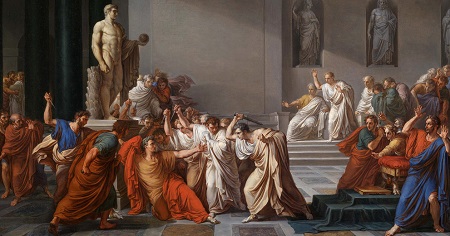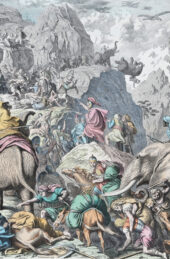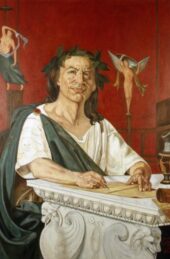Tony Blair and the Russian oligarch, Boris Berezovsky, didn’t have a part a year ago when I was first writing about The Last Assassin: The Hunt for the Killers of Julius Caesar. Now that the paperback is coming out, it seems a bit easier to write about the rather strange roles that they both played in its beginnings. My last assassin was Cassius from Parma, a small man in a big event, the last of Julius Caesar’s killers to be hunted to death by Caesar’s adopted son, but never big enough for stage or screen. It was 25 years ago that I first heard his name, in Latin, Cassius Parmensis, it came in a light Russian accent at a London hotel breakfast. There were armed security guards at every nearby table. Boris Berezovsky was a very rich Russian, also a nervous one.
This was not so unusual a start to the day. I was then Editor of The Times, a job in which all sorts of worried people want to share your breakfast, sometimes to help you with information, more often, like Berezovsky, to try to help themselves. My guest was in exile. After the end of the Soviet Union, he was one of those who had ended up with a large chunk of the national economy in his own bank accounts. He was a favourite of the first new regime, but he had many enemies, some of whom had already exploded bombs in his car. He thought that by writing and talking to editors – as well as by hiring good guards – he might protect himself.
Over my bacon and eggs, he said he felt like Trotsky. He had ordered some kind of seaweed breakfast himself, which took about an hour to arrive. So, we had plenty of time for him to develop this theme. He said he felt like Trotsky in Mexico City awaiting the vengeance of Stalin in 1940. I’d nodded politely at that bit of self-aggrandisement. Then he changed times and continents. He felt like Cassius Parmensis, he said.
I felt a bit uncomfortable. I was the classicist, albeit part-time in those days. He was the political financier. I had never heard of Cassius Parmensis and he, obviously, had. Yes, he said, the last assassin of Julius Caesar, waiting for the executioner from the first Emperor of Rome, the very man whose rise he had fought to prevent, whose job he had thought should not exist.
This was a name I felt I should have known. Probably, that showed. He sensed a victory. He understood a fear like that of Parmensis, he went on – how to overcome it, how to get on with life despite it. I was impressed. After breakfast, I looked up the name of Cassius Parmensis, one of a crowd of dagger-wielding senators on that famous Ides of March 44 BC, probably somewhere towards the back. He was not the star of the show, not even a best supporting star. But he had the chance to see a lot.
His name was taken from the town that is now famed for ham and cheese. It was then a bit of a backwater – and for much of the year its fields were actually underwater. It wasn’t even quite in Italy and its people then were mainly ex-soldiers loyal to Julius Caesar who had given them their farms. Many of those who stabbed Rome’s dictator were Caesar’s friends. What was unusual about Parmensis was that he escaped the revenge of Caesar’s heirs the longest. He saw much more of the results of what he had done than Marcus Brutus, Gaius Cassius and the other grander assassins did. He gives us a somewhat lower view of events, the consequences of Caesar’s death not just its causes.
The problem of consequences brings me to the second of the accidents that brought this book about. Seven years after my breakfast with Boris Berezovsky, I had stopped being Editor of The Times and was at a very different breakfast in Ten Downing St, with Tony Blair, during the Iraq War. Neither bacon and egg nor seaweed then, only a very old croissant.
Assassination was our morning subject. Blair had been very happy to join the invasion to assassinate Saddam Hussein. He just couldn’t see why so many others disagreed, not only those in the streets opposed to any invasion but those who argued that if he was so keen on killing one evil tyrant why didn’t he go for a lot of others too?
What about Robert Mugabe in Zimbabwe, people said to him, and the generals who were then in charge of Burma? At one point, he kicked a filing cabinet and said that it wasn’t that he didn’t want to do the right thing by the people of Zimbabwe but that he couldn’t. Mugabe and what he called ‘the Burmese lot’, however deserving of assassination, were outside his reach.
Getting rid of Saddam was just as right but, more significantly, it was possible. ‘When you can do the right thing, you should’, he added, with a last attack on the grey steel files. He didn’t quite say ‘damn the consequences’ but the drift was clear enough.
Both rightness and consequence were problems facing the potential assassins of Julius Caesar, particularly the minor assassins. After all, Julius Caesar had only recently come to seem the biggest menace to the Roman way of life. In his younger days he was just another member of the city’s jostling aristocratic families. He had done more or less the proper legal things. He had shared all those Roman offices that had been put in place over 450 years to stop one-man rule returning.
But then, as a brilliant general, most recently in Gaul, he had conquered so much, written so much and so well about his conquests, and collected so much wealth, that he no longer felt constrained by those rules. He felt threatened by them. In January 49 BC, five years before the plot was formed, he had brought his legions across the Rubicon River, from near Parma in Gaul, into Italy itself. He had defeated the armies of his rival Pompey and had made himself dictator, then dictator for life.
The defeat of his enemies produced a new problem for his friends. Was it acceptable to have a dictator? Possibly, some thought. Rome had had dictatorships before. But what if Caesar was thinking of a permanent hereditary dictatorship a monarchy in which young Caesars would replace the old. Would that be right? Probably not.
Just as importantly for those less bothered by philosophy, what sort of jobs would be left for the rest? Where would their places, and their children’s place be, if only a Caesar could rule? There were serious arguments about both points, conviction and consequence. If they acted on what was right and got rid of Caesar, would their world return to normal?
And did it even matter what the consequences would be? If it was the right thing to assassinate a dictator, surely it was right regardless of what might happen next. Some joined the plot. Others did not. The minor men were important. They were necessary for it to be high politics not low crime. An assassination by a paid slave in a dark alley would have been much more reliable. But to be a political act this had to be a joint action by his equals. Cassius Parmensis somehow fell into the plot. We don’t know precisely how. We do know that he, and men like him, had to be there.
The consequences for the killers came fast. There was a brief period in March 44 when it looked as though there might be an amnesty, a policy of no applause but forgive and forget, continuing with the jobs that Caesar had promised his followers for the future but pretending that they had come about in the old and normal way.
This needed a bit of philosophical casuistry itself: for, if Caesar had been a tyrant justly killed, surely all his plans should be abandoned. And if he hadn’t been justly killed, his assassins should be strangled in gaol not given provinces to rule. But with a clever man like Cicero to help, a suitable compromise was sorted out.
Within a year, however, this neat plan of no praise but no blame was in pieces. A smart teenage student, Octavian, whom Caesar had designated as his heir, soon discovered the power of the dead dictator’s name. Mark Antony, who saw himself as Caesar’s grown-up heir, had been a happy architect of the amnesty. He soon found that he could inherit from Caesar only by matching Octavian in revenge. The names of the assassins began to appear on white boards, a license for anyone to decapitate them for cash.
To save their lives, the assassins had to leave town – and fight their battles elsewhere. All were pursued, slaughtered, tortured, beheaded, individually and in groups, in a drama that lasted fourteen years. The theatre of war stretched from Parma itself, reduced to ashes by Mark Antony’s brother, to the northeast Mediterranean.
Any idealism of the assassins’ leaders came up sharply against the need to loot and terrorise to pay their armies. Parmensis played a bigger part in this second phase than in the first. He long remained confident that the assassins’ ruthlessness as war leaders would prevail even though their political instincts at home had not.
We don’t have much left of his writing. But we do have an ingratiating letter to Cicero from Cyprus in the summer of 43 BC, pointing out his personal successes and looking forward to the good times in Rome they would all have after their victory.
Cicero died soon afterwards, his head and hands taken in exchange for the new Caesar’s cash. And by the time, more than a decade on, that Parmensis became the last assassin to die, Rome was at the start of the very hereditary dynasty of Caesars that the assassins had determined to stop.
Parmensis’s story, as I reconstructed it, is one of seeing the consequences of one’s own dramatic action. He had his own conflicting philosophical views, as a follower of the Greek philosopher, Epicurus, a guru who believed that politics of any kind was a threat to a man’s all-important peace of mind. A good Epicurean should stay at home, be generous to all, women, slaves, everyone, but let the rest of the world go wreck itself. Why should the wise man risk his hard-won calm for the sake of the foolish?
This was an increasingly fashionable point of view. Yet, surely as it was argued by the plot-leaders to the waverers, there had to be a certain level of political tyranny which would destroy anyone’s peace of mind. Some agreed. Some did not. These were serious debates which long echoed into European political thought.
The lessons of art played their part too. The last assassin, like others in the plot, lived with old myth as well as new philosophy. He was not a great artist but one who, like many politicians, saw himself as an artist. One of his plays was about mythology’s most brutal revenge tragedy, the story of the Greek king Thyestes forced to eat his own children by his brother.
Another was about the rape of Lucretia and the founding of the Roman Republic after the expulsion of the kings. We have one surviving line from it, thanks to Marcus Terentius Varro, a very lucky survivor of the names on the white boards of Rome: Nocte intempesta nostrum devenit domum, Parmensis wrote. Late at night he came down to our house, like the avenger pursuing Parmensis himself.
In the violent years after Caesar’s assassination, Parmensis was an important player but not at the land battles made famous by Shakespeare, sailing away to fight in massive, but mostly forgotten naval struggles around Sicily, a stubborn survivor who over fourteen years after the ides of March backed every side apart from the winning one. His last battle was at Actium in western Greece on the losing side of Antony, his long-time enemy.
After that, Parmensis had nowhere to go but to the safest exile he could find. He chose Athens, the university of the Mediterranean where he could read, write, talk, and look back. When Octavian’s soldier arrived, there was not only Parmensis himself inside the house, sleepless and suffering nightmares of a dishevelled giant in his room, but the manuscript of his play, Thyestes, that ultimate play of revenge. Some said that the executioner stole it to be used to celebrate Actium’s first anniversary.
In 2003, after I’d spent the Iraq War as a journalist alongside Tony Blair, I wrote a book about that which included that filing cabinet scene, the question of whether, regardless of the terrible consequences, the assassination of Saddam Hussein could be right. History has so far tended to give the answer, ‘No’ though Blair himself, revelling all the more in his Roman rectitude as he grows older, says ‘Yes’ whenever he is asked.
And what happened to Berezovsky? Sadly, he did not do so well. In 2013, he was found hanged in the bathroom of his billionaire’s house in Berkshire. He had just lost a multi-million-dollar court case. He had reasons to kill himself – but also other people had reasons to kill him.
The police checked the bathroom surfaces with Geiger counters. No granite, the court was told, had been left unturned. Relatives suspected murder. The coroner was unconvinced. He declared an open verdict, allowing suspicions, conjectures, imaginative reconstructions, search for further evidence, a regular kind of entrance into the history books, one of which he would have probably approved.
Peter Stothard was editor of The Times, and the Times Literary Supplement and is an author, journalist, and critic. His latest book, The Last Assassin: The Hunt for the Killers of Julius Caesar, is out now in paperback.







